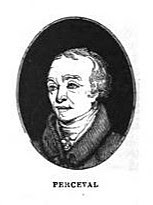 |
| Spencer Perceval from The Life and Administration of the Right Hon. Spencer Perceval by Charles Williams (1813) |
On 11 May 1812, Spencer Perceval was assassinated. He remains the only British Prime Minister to have been assassinated.
A difficult political situation
Spencer Perceval became First Lord of the Treasury in 1809 when the Duke of Portland’s health made it impossible for him to continue leading the government. He was not the King’s first choice, but such was the division in the government at the time that many of the politicians refused to serve with one another. Perceval was eventually chosen to form a cabinet, effectively making him Prime Minister. He also kept the role of Chancellor of the Exchequer as no one else would accept it.
The assassination
The June 1812 issue of La Belle Assemblée included a long account of the assassination of Perceval and subsequent trial of his murderer. It gave the following account of the assassination:
On the 11th May, about a quarter past five, as the Right Honourable Spencer Perceval, Chancellor of the Exchequer and First Lord of the Treasury &c. &c. was entering the lobby of the House of Commons, he was shot by a person of the name of Bellingham, who had place himself for that purpose at the side door leading from the stone staircase. Mr Perceval was in company with Lord F Osborne, and immediately on receiving the Ball, which entered the left breast, he staggered and fell at the feet of Mr W Smith, MP for Norwich, who was standing near the second pillar. The only words he uttered were – “Oh! I am murdered,” and the latter was inarticulate, the sound dying between his lips. He was instantly taken up by Mr Smith, who did not recognise him until he had looked in his face. The report of the pistol immediately drew great numbers to the spot, who assisted Mr Smith in conveying the body of Mr Perceval into the Speaker’s apartments, but before he reached them, all signs of life had departed.1
The assassin
John Bellingham, a disgruntled bankrupt, shot Perceval as the figurehead of the government which he held responsible for his financial misfortune. Had he been of a mind to escape, he probably could have done so, as little attention was paid him in the furore surrounding the fallen Perceval. However, such was not his intention. Bellingham was arrested, tried at the Old Bailey, pronounced guilty and sentenced to death.
Tribute to Perceval
Before the death sentence was given, the Recorder spoke these words:
You have been guilty of the murder of a person whose suavity of manners disarmed hostility and rancour. By his death charity has been deprived of its warmest friend, and religion of its best support, and the country of its greatest ornament. A man whose public character and talents were capable of saving his country. The murder you have perpetrated in the midst of unarmed men, confiding in their innocence and the sacred functions vested in them by their country, and in the very sanctuary of the law.2
 |
| Spencer Perceval from The Georgian Era (1832) |
This post was written on 11 May 2012 to celebrate the 200th anniversary of Spencer Perceval's assassination.
Notes
1. Bell, John, La Belle Assemblée (May 1812)
2. Ibid.
2. Ibid.
Sources used include:
Bell, John, La Belle Assemblée (1812, London)
Clarke, The Georgian Era (Vizetelly, Branston and Co, 1832, London)
Williams, Charles, The Life and Administration of the Right Hon. Spencer Perceval (1813)

The recorder spoke very eloquently I thought. Thank you for the article!
ReplyDeleteThanks for your kind comments. If only we could make such statements about today's politicians!
Delete